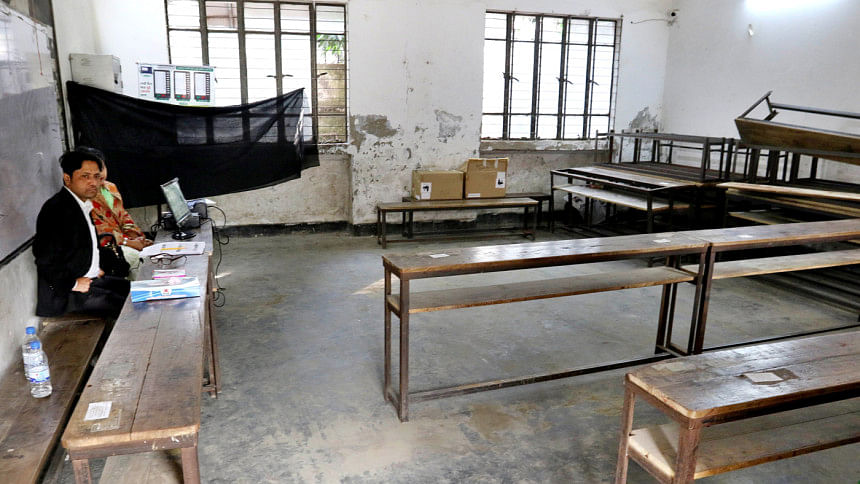The EC must answer for the disillusionment of the people

The Dhaka city corporation elections held yesterday only reiterated what is increasingly becoming a disturbing trend in elections in the country—low voter turnout. In sharp contrast to the loud and wasteful campaigning that characterised the run-up to the elections, voter turnout in most polling centres on February 1 was abysmal, signifying a general disillusionment and frustration among the public regarding the electoral process.
And why wouldn't the people be disillusioned? What did the Election Commission (EC) do during the national elections in 2018, and upazila and DNCC elections in 2019 to gain people's trust that it would hold a free and fair election—one in which their choices and voices would matter? Was the EC able to ensure a level playing field for all candidates and create a conducive environment where voters can exercise their democratic right without fear of coercion or harassment? If anything, the EC has been consistent in its complete disregard for any concerns raised by opposition parties, civil society and the general public regarding discrepancies and favouritism in the electoral process. This election, unfortunately, was no exception. The EC has deliberately ignored dissenting voices, even when it originated from within the commission itself. Rather than accept responsibility for the low turnout rates, the EC has, once again, and in a characteristic style, blamed the candidates for their failure to draw the voters. In their haste to pass on the buck, they have perhaps forgotten that the onus lies on them to assure the voters that their votes do count.
The controversial manner in which the EC took the decision to install EVMs in all polling centres in the city—without addressing opposition concerns and building public confidence in a new technology—perhaps only made voters more nervous. Our reports suggest that the public had good reasons for concern. For one thing, many reported that their fingerprints didn't match with the database and hence they were unable to cast their votes. Yet others noted the almost complete lack of privacy in choosing a candidate and the direct and indirect intimidation of ruling party polling agents in the booths. In many reported instances, taking advantage of people's confusion regarding how to use EVMs, polling agents cast the vote on their behalf. In more severe instances, supporters of opposition parties, who were "caught" voting for other parties, were harassed. Similar allegations had also been made during the national elections in 2018 and we had warned the EC that such incidents could happen again if they did not take enough precautions. Unfortunately, they did not, and they also failed to educate people on how to use EVMs so that they could not be easily manipulated.
Meanwhile, the EC has not only downplayed the allegations of harassment and intimidation of BNP polling agents but the Chief Election Commissioner Nurul Huda has gone so far as to suggest that polling agents should have the strength to stay put at polling centres. It is of grave concern that instead of investigating these allegations seriously, the EC would rather encourage polling agents to engage in a turf war at the polling booths. We are further troubled by reports of harassment and violence against journalists while discharging their professional duties. For instance, a crime reporter from an online portal was attacked and seriously injured, reportedly for trying to take photographs of a procession where some youth were allegedly carrying firearms and sharp weapons. Yet other journalists, including from The Daily Star, were attacked and harassed when they tried to take photographs and driven out of the polling stations. Why were journalists attacked and driven away if, as the EC claims, the election was free, fair and peaceful?
In the end, perhaps we should not be surprised that the elections turned out the way they did. When an Election Commission fails to stay neutral and dispense its responsibilities and obligations according to its constitutional mandate—allowing parties to become bigger than the people—disillusionment in the political process is only inevitable. We must acknowledge how serious this apathy can be and find a way to restore the faith of voters in democracy. We can and must do better.

 For all latest news, follow The Daily Star's Google News channel.
For all latest news, follow The Daily Star's Google News channel. 



Comments